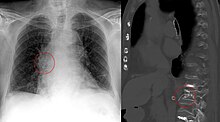embolism
| Classification according to ICD-10 | |
|---|---|
| I74.9 | Embolism and thrombosis of unspecified artery |
| I82.9 | Embolism and thrombosis of unspecified vein |
| T79.0 | Air embolism (traumatic) |
| T79.1 | Fat embolism (traumatic) |
| ICD-10 online (WHO version 2019) | |
In medicine, an embolism [ ɛmboˈliː ] means the partial or complete sudden closure of a blood vessel by material washed in with the blood . This embolus can consist of the body's own and foreign substances such as fat droplets, amniotic fluid, blood clots (detached vascular plug) or air bubbles.
Word origin
"Embolie" is a term coined by Rudolf Virchow , who called small coagulated blood parts "emboli" and derived from ancient Greek ἐμβάλλω emballo "to throw in" and embolus "vascular plug".
Classification

Embolisms can be divided into:
- according to the cause:
- Thromboembolism (washing in of a blood clot )
- Fat embolism (flooding in of fat droplets, e.g. after large, open bone fractures )
- Gas embolism or air embolism (after injection of air or due to the formation of gas bubbles if the surface is too rapid from great depths, see decompression sickness ; in veterinary medicine: gas bubble disease in fish)
- Tumor embolism (blockage of blood vessels by tumor tissue) as an important mechanism of metastasis
- Amniotic fluid embolism ( birth complication)
- Septic embolism (e.g., in bacterial endocarditis )
- Cholesterol embolism (not synonymous with fat embolism): mostly from ruptured plaques on the arterial wall
- Cement embolism due to bone cement that has passed into veins, for example in the context of a kyphoplasty or an endoprosthesis implantation
- Foreign body embolism, for example through a torn catheter
- Talc embolism with intravenous drug use
- by location of the embolism:
- Pulmonary embolism (= venous embolism): The embolus originates from veins in the body and clogs the pulmonary arteries after passing through the right half of the heart .
- Arterial embolism: Embolus originates from the heart or large arteries and clogs arteries (e.g. stroke , myocardial infarction , mesenteric infarction , occlusion of a leg artery , retinal artery occlusion )
- Paradoxical embolism (= crossed embolism): The embolus originates from the veins and clogs arteries (apart from the pulmonary arteries). Only possible if the thrombus passes through an open atrial septum ( persistent foramen ovale or other forms of atrial septal defect ) or through a ventricular septal defect .
- An embolus that hangs on a bifurcation is known as a riding embolus .
The most common embolisms are thromboembolism after a thrombosis of the deep veins in the leg ( pulmonary embolism ) and thromboembolism in the arteries of the brain ( stroke ). In Germany, 20,000 to 25,000 people die of an embolism every year.
prophylaxis
Thromboses can be avoided in high- risk patients by the prophylactic subcutaneous injection of heparins , today mostly low molecular weight heparin, or above all by physical measures such as early mobilization , intermittent compression or medical thrombosis prophylaxis stockings (MTPS). Heparins are given to patients at high risk; physical prophylaxis is indicated in all risk groups. See also the AWMF S3 guidelines on outpatient and inpatient thromboembolism prophylaxis, which has been ratified by 20 operating medical professions .
therapy
Embolisms that have arisen from thrombi can, under certain circumstances, be dissolved with medication ( thrombolysis ). Sometimes an operation to remove the embolus ( embolectomy ) is necessary .
See also
Web links
Individual evidence
- ^ Heinz Otremba: Rudolf Virchow. Founder of cellular pathology. A documentation. Echter-Verlag, Würzburg 1991, p. 22 f.
- ↑ a b Gerd Herold : Internal Medicine 2019 . Cologne 2018, p. 839.